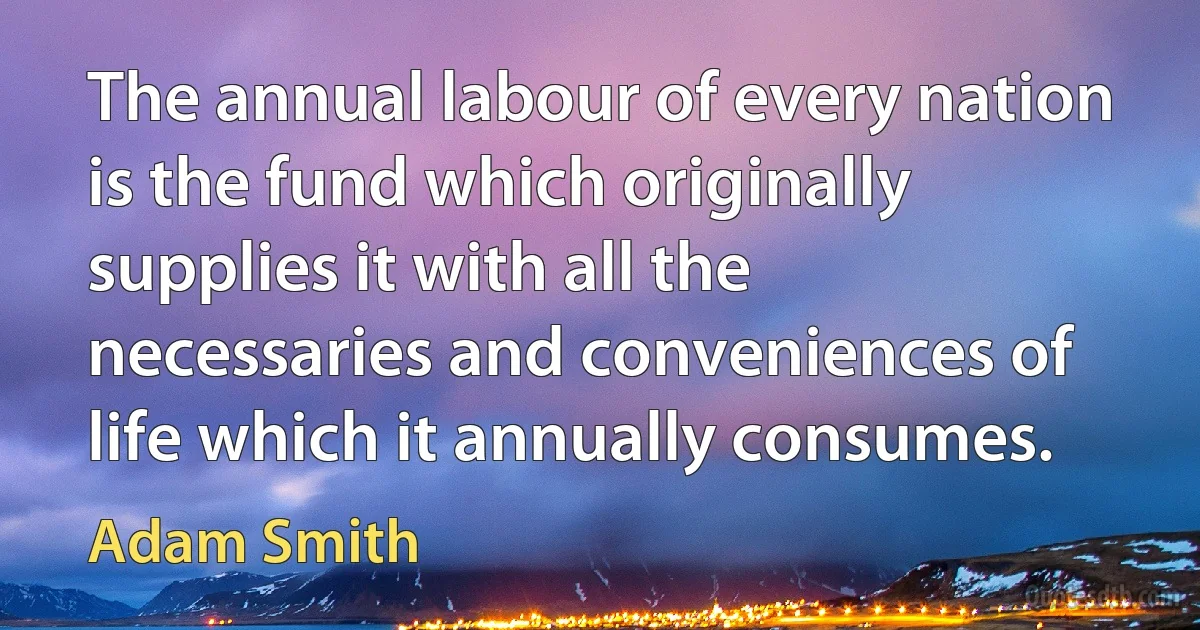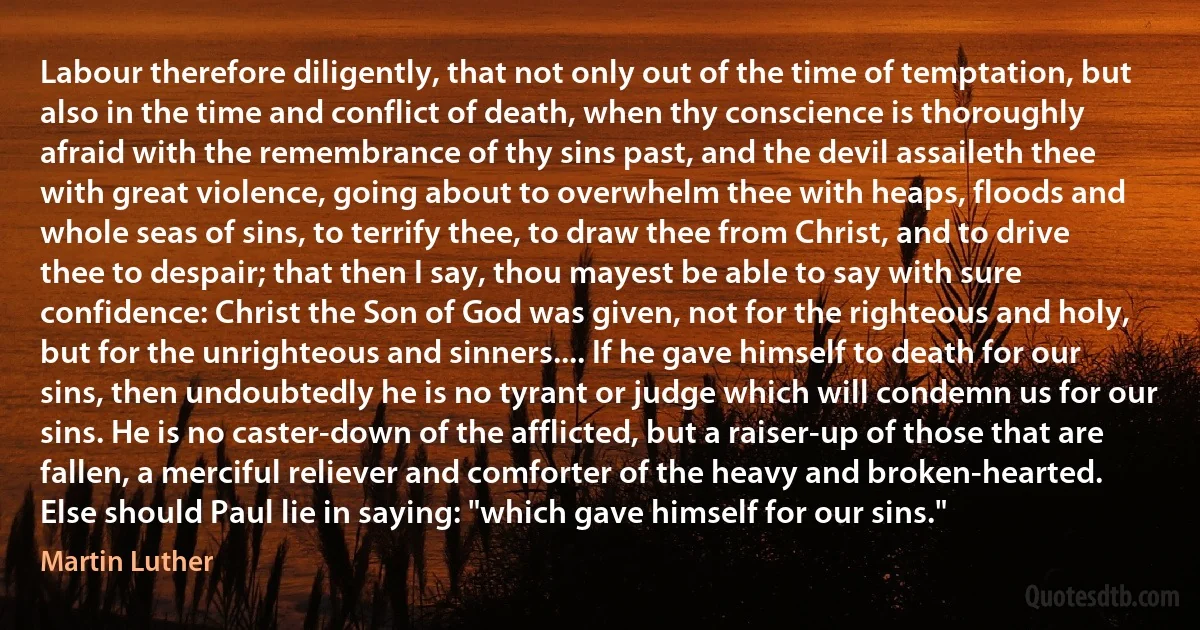Labour Quotes - page 21
In the most trying hours, through dismal nights and endless interrogations and maltreatment, during days of killing solitude in cells and close confinement, we were always sustained by the hope that all these agonies were not in vain, that there was a strong and mighty country, however far away, in which all the dreams for which we were fighting had been fulfilled. For us it was the homeland of the workers, in which labour was honoured, in which love, comradeship, and sincerity prevailed. With what joy I had felt the strength of that country as, emerging from prison in 1934, I listened in the dead of each night to Radio Moscow and heard the clock of the Kremlin tower striking the hours, and the stirring strains of the 'International.

Josip Broz Tito
I live in the Managerial Age, in a world of "Admin." The greatest evil is not now done in those sordid "dens of crime" that Dickens loved to paint. It is not done even in concentration camps and labour camps. In those we see its final result. But it is conceived and ordered (moved, seconded, carried, and minuted) in clean, carpeted, warmed, and well-lighted offices, by quiet men with white collars and cut fingernails and smooth-shaven cheeks who do not need to raise their voice. Hence, naturally enough, my symbol for Hell is something like the bureaucracy of a police state or the offices of a thoroughly nasty business concern.

C. S. Lewis
The nature of unemployment today is totally different from what it was a year ago. It is no longer caused by a deficiency of demand. There is no longer a potential surplus supply of the things we want. The transition to full employment is hindered by two obstacles. The first is due to the difficulty of shifting labour to the points where it is wanted. The second- and, for the time being, the chief--obstacle is caused by the difficulties, other than the shortage of labour, in the way of existing demand becoming effective.

John Maynard Keynes
Why should coal miners suffer a lower standard of life than other classes of labour? They may be lazy, good-for-nothing fellows who do not work so hard or so long as they should. But is there any evidence that they are more lazy or more good-for-nothing than other people?
On grounds of social justice, no case can be made out for reducing. the wages of the miners. They are the victims of the economic Juggernaut. They represent in the flesh the "fundamental adjustments" engineered by the Treasury and the Bank of England to satisfy the impatience of the City fathers to bridge the "moderate gap" between $4.40 and $4.86. They (and others to follow) are the "moderate sacrifice" still necessary to ensure the stability of the gold standard. The plight of the coal miners is the first, but not-unless we are very lucky-the last, of the Economic Consequences of Mr. Churchill.

John Maynard Keynes
Those truly natural wants, which reason alone, without some other help, is not able to fence against, nor keep from disturbing us. The pains of sickness and hurts, hunger, thirst, and cold, want of sleep and rest or relaxation of the part weary'd with labour, are what all men feel and the best dispos'd minds cannot but be sensible of their uneasiness; and therefore ought, by fit applications, to seek their removal, though not with impatience, or over great haste, upon the first approaches of them, where delay does not threaten some irreparable harm. The pains that come from the necessities of nature, are monitors to us to beware of greater mischiefs, which they are the forerunner of; and therefore they must not be wholly neglected, and strain'd too far. But yet the more children can be inur'd to hardships of this kind, by a wise care to make them stronger in body and mind, the better it will be for them.

John Locke
The man who employs either his labour or his stock in a grater variety of ways than his situation renders necessary, can never hurt his neighbour by underselling him. He may hurt himself, and he generally does so. Jack of all trades will never be rich, says the proverb. But the law ought always to trust people with the care of their own interest, as in their local situations they must generally be able to judge better of it than the legislator can do.

Adam Smith
The freest importation of salt provisions, in the same manner, could have as little effect upon the interest of the graziers of Great Britain as that of live cattle. Salt provisions are not only a very bulky commodity, but when compared with fresh meat, they are a commodity both of worse quality, and as they cost more labour and expence, of higher price. They could never, therefore, come into competition with the fresh meat, though they might with the salt provisions of the country.

Adam Smith
Tony Blair: Has the Prime Minister secured even the minimal guarantee from the Euro-rebels that, on a future vote of confidence on Europe, they will support him?
John Major: I can sense the concern in the right hon. Gentleman's voice. Perhaps he would like to tell me whether he has received the support of the 50 MPs who defied his Front Bench over Maastricht; of the 40 who defied him over European finance; on a single currency, where the right hon. Member for Copeland (Dr. Cunningham) was in dispute with the deputy leader of the Labour party; and on clause IV, which half his, I think he called them, infantile MEPs want to keep. He does not, and his deputy leader does one day and does not the next. These are party matters. Will the right hon. Gentleman tell us what his position is?
Tony Blair: There is one very big difference-I lead my party, he follows his.

Tony Blair
Sir Michael Spicer: What are the characteristics of old Labour that he dislikes so much?
Tony Blair: I am afraid that the Hon. Gentleman will have to repeat that.
Sir Michael Spicer: What are the characteristics of old Labour that he dislikes so much?
Tony Blair: Basically, that it never won two successive terms of Government and, perhaps, that it never put the Conservative party flat on its back, which is where it is now. Thankfully, we are running an economy with low inflation, low mortgage rates and low unemployment; fortunately, we are doing a darn sight better than the Government of whom the right hon. Gentleman was a Member, who had-I thank him for allowing me to mention this-interest rates at 10 per cent. for four years, 3 million unemployed and two recessions. Whether it is old Labour or new Labour, it is a darn sight better than the Tories.

Tony Blair
Robert Hughes (Labour MP for Aberdeen North): With regard to the Prime Minister's desire for a classless society and social mobility, will he explain why there are no women in his Cabinet, or is the only woman in his Cabinet the back-seat driver?
John Major: In recent years, in all aspects of life in this country, women have been taking a higher profile: in the law, in commerce, in the civil service, in industry and in politics - and that will continue. As those women would wish it to be, they will reach the top on merit - oh yes, and if the hon. Gentleman is patient, he will find women aplenty in top positions in my Government. Indeed, if he had waited awhile, perhaps even to the end of today, he would not have asked that question.

John Major
The programme of the British Labour Party under Neil Kinnock is so wildly irresponsible, so separate and apart from the historic NATO strategy, that I think a Labour government that stood by its present policies-and I rather doubt that they would-would, if it didn't destroy the Alliance, at least diminish its effective ability to do the task for which it was created.

Richard Perle
I am sorry I can say nothing more consoling to you, for love in action is a harsh and dreadful thing compared with love in dreams. Love in dreams is greedy for immediate action, rapidly performed and in the sight of all. Men will even give their lives if only the ordeal does not last long but is soon over, with all looking on and applauding as though on the stage. But active love is labour and fortitude, and for some people too, perhaps, a complete science. But I predict that just when you see with horror that in spite of all your efforts you are getting farther from your goal instead ofnearer to it - at that very moment I predict that you will reach it and behold clearly the miraculous power of the Lord who has been all the time loving and mysteriously guiding you.

Fyodor Dostoyevsky
![Believing that these propositions, and the [conclusions] I draw from them can not be successfully controverted, I, for the present, assume their correctness, and proceed to try to show, that the abandonment of the protective policy by the American Government, must result in the increase of both useless labour, and idleness; and so, in pro[por]tion, must produce want and ruin among our people. (Abraham Lincoln)](https://cdn.quotesdtb.com/img/quotes_images_webp/00/abraham-lincoln-abandonment-american-300100.webp)


